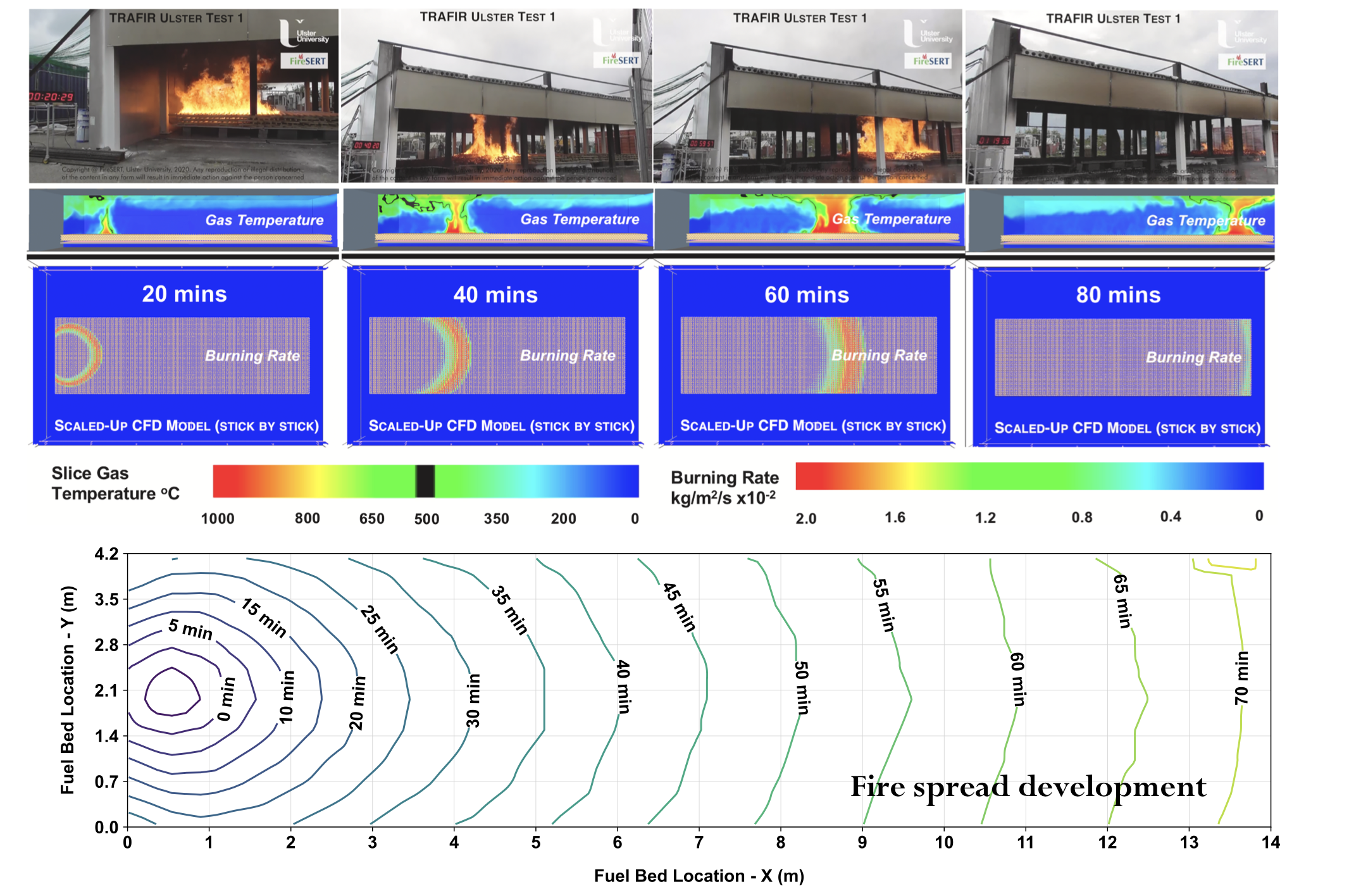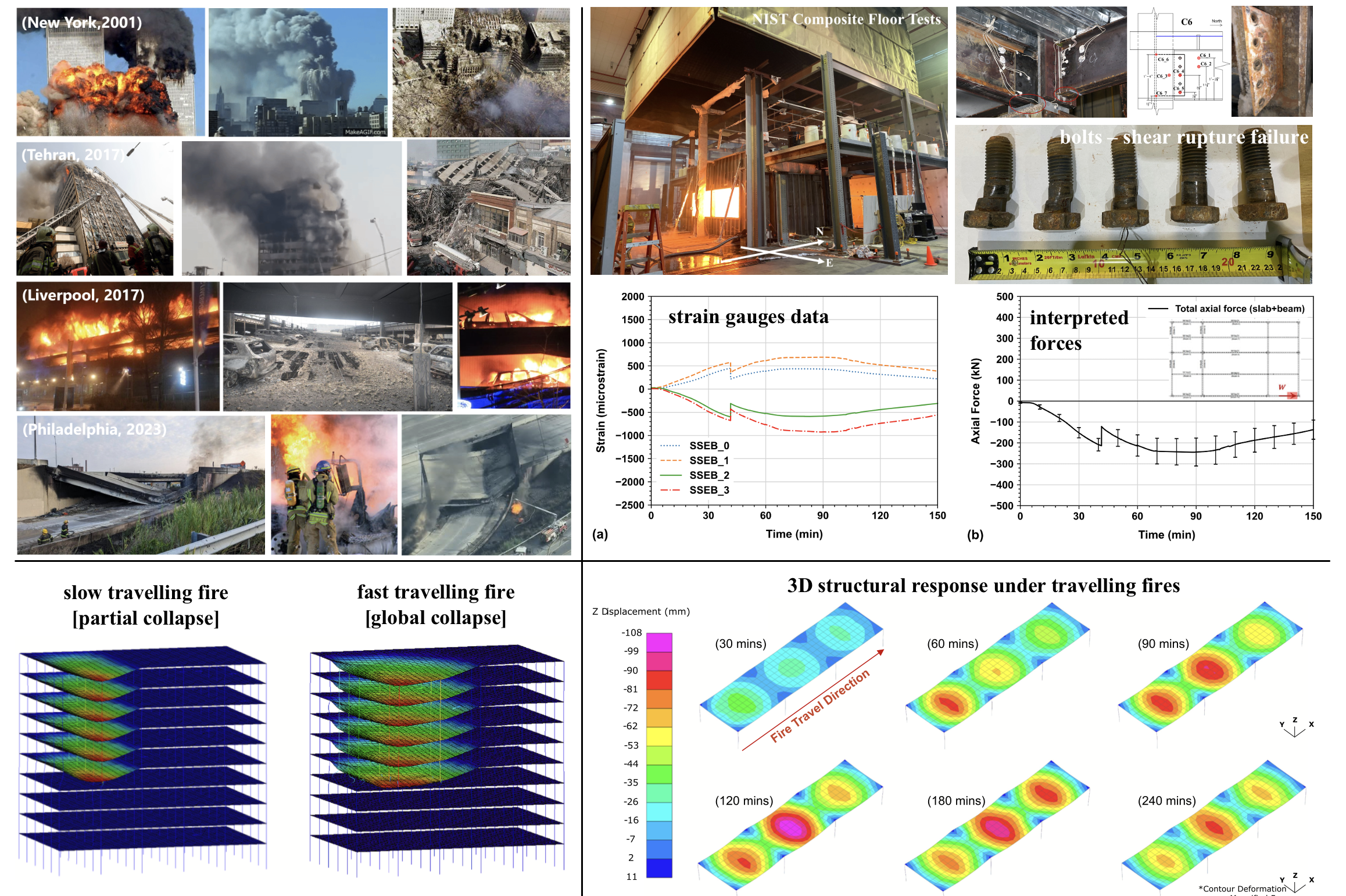Research
Dr Xu Dai's field of expertise is the fire-structure coupling via numerical and experimental methods. He specialises in characterising real fires in large compartments and subsequent critical evaluation of the failure of steel-concrete composite structure from the system level. His ultimate goal is to mitigate the worldwide loss due to structural failure under fire through developing theoretical methods for performance-based design.
He especially enjoys tackling multidisciplinary problems via coupling structural engineering and fire engineering at a first principles level, via combining modelling and experimental techniques. He has been prolific at publishing the work, with 18 journal papers of which 10 as leading/corresponding authors (Google h-index 16, collecting over 650+ citations), including contributions in Engineering Structures, Fire Safety Journal, Advances in Engineering Software, Fire and Materials, Fire Technology, etc. He is currently supervising three PhD students as the primary supervisor, and four PhD students as the co-supervisor. He has also supervised 10+ MSc/MEng/BEng students.
Current PhD students as a primary supervisor:
Billy-Ray Slaughter, University of Liverpool, UK, 2026 – present
PhD Topic: Reliable AI-driven Fire Safety Design: Enhancing CFD Modelling Efficiency with Trustworthy AI
Funding source: SOCOTEC UK & Ireland, University of Liverpool
Xiyue Ming, University of Liverpool, UK, 2025 – present
PhD Topic: Quantifying Fire Size, Structural Failure, and Water Pollution from Lithium-Ion Battery Fires in Ro-Ro Cargo Maritime Firefighting
Funding source: Artec Fire Ltd, EPSRC N0MES CDT, University of Liverpool
Morvarid Koohkhezri, University of Liverpool, UK, 2024 – present
PhD Topic: Design of car parks against fire: is the current guidance adequate?
Funding source: Ashton Fire, University of Liverpool, Research England
Current PhD students as a co-supervisor:
James B., secondary supervisor, University of Liverpool, UK, 2025 – present
PhD Topic: Unravelling the Data Behind Battery Fires
Funding source: EPSRC N0MES CDT, University of Liverpool
Richard Clark, secondary supervisor, University of Liverpool, UK, 2025 – present
PhD Topic: The role of fire statistics in the assessments and improvements of fire safety regulations in the UK
Funding source: Fire Service Research & Training Trust
Hongxin Zhuang, secondary supervisor, University of Liverpool, UK, 2024 – present
PhD Topic: Fire financial losses: cost components, methodologies, and the impact of fire safety measures in buildings
Funding source: NTHU PhD Studentship, Graduate Association Hong Kong & Tung Postgraduate Scholarships
Chang Liu, co-Supervisor (external), University of Edinburgh, UK, 2022 – Present
PhD Topic: Characterisation of travelling fires in large compartments using CFD modelling
Previous PhD students:
Zhuojun Nan, co-Supervisor (external), Hong Kong Polytechnic University, HK, 2020 – 2023
PhD Topic: Towards safer buildings: An integrated approach for structural fire analysis, design and collapse prediction
Funding source: Hong Kong Research Grants Council (T22-505/19-N, SureFire) & Hong Kong Polytechnic University
PhD opportunities:
If you're interested in a PhD project, please contact Xu directly via his email. He can help you to gain PhD studentship via different routes.
Research interests:

Characterization of realistic fires in the large compartment
Relevant publications:
1. Scaling-up” fire spread on wood cribs to predict a large-scale travelling fire test using CFD
2. CFD predictions of fire spread over wood cribs in large open-plan compartments: New insights
3. An engineering CFD model for fire spread on wood cribs for travelling fires
4. Tisova Fire Test – fire behaviours and lessons learnt
5. Travelling fire in full scale experimental building subjected to open ventilation conditions
6. Modelling the influence of steel structure compartment geometry on travelling fires
7. Travelling fire experiments in steel-framed structure: numerical investigations with CFD and FEM
8. Large scale travelling fire tests and their effect on the surrounding steel structure – the second fire test
9. FDS simulations and modelling efforts of travelling fires in a large elongated compartment

Steel-composite structural failure from system level in fire
Relevant publications:
1. A numerical study on the significance of slab for the response of a prototype structure under travelling fires
2. Thermal and structural response of beam-end shear connections during a large compartment fire experiment
3. A numerical investigation of 3D structural behaviour for steel-composite structures under various travelling fire scenarios
4. Modelling of composite fin-plate connections under fire conditions using component-based method
5. Disproportionate collapse of steel-framed gravity buildings under travelling fires
6. Experimental study on fire resistance of a full-scale composite floor assembly in a two-story steel framed building
7. Fire resilience of a steel-concrete composite floor system: full-scale experimental evaluation for U.S. prescriptive approach with a 2-hour fire-resistance rating (Test #1)
8. Fire resilience of a steel-concrete composite floor system: full-scale experimental evaluation for influence of slab reinforcement (Test# 2)

Travelling fire method for performance-based structural design
Research grants
PSF 25/26
RESEARCH ENGLAND (UK)
August 2025 - July 2026
Over-ventilated vs. under-ventilated “travelling fires”, which one is right?
ROYAL ACADEMY OF ENGINEERING (UK)
September 2024 - July 2025
Policy Support Fund 2024/25 (previously PPQR)
RESEARCH ENGLAND (UK)
August 2024 - July 2025